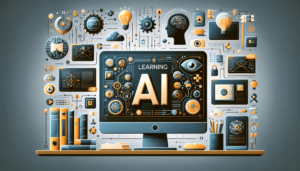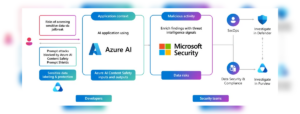Introduction:
In the ever-evolving realm of finance, Artificial Intelligence (AI) emerges as a game-changer, reshaping traditional practices and unlocking new possibilities. This exploration delves into 10 transformative ways AI is revolutionizing financial landscape from enhancing efficiency to mitigating risks and providing personalized services.
Intelligent Customer Service
AI-driven chatbots and virtual assistants are transforming customer service in finance. Analogous to a 24/7 digital teller, these AI systems respond to customer queries, provide account information, and even assist in financial planning. A real-world example is Bank of America’s Erica, an AI-powered virtual assistant helping customers manage their finances seamlessly.
Read More: 3 Books to Master Artificial Intelligence in VLSI Design – techovedas
Fraud Detection and Prevention
AI algorithms act as vigilant sentries in detecting and preventing fraudulent activities. Similar to a watchful guardian, these systems analyze patterns, identify anomalies, and alert financial institutions to potential fraud. For instance, AI-powered fraud detection tools like Feedzai are employed by banks to safeguard transactions in real-time.
Algorithmic Trading
AI excels in analyzing vast datasets and making split-second decisions, making it a powerful force in algorithmic trading. Like a savvy market maverick, AI algorithms predict market trends, execute trades, and optimize portfolios. Hedge funds and financial institutions leverage AI to gain a competitive edge in trading.
Credit Scoring and Risk Assessment
AI transforms the credit scoring process by assessing risk more accurately. Comparable to an astute credit analyst, AI considers a multitude of factors beyond traditional credit history, providing a more comprehensive evaluation. ZestFinance, for instance, uses AI to enhance credit underwriting, especially for underserved populations.
Personalized Financial Advice
AI-powered robo-advisors offer personalized financial advice and investment strategies. Similar to a knowledgeable financial planner, these systems analyze user data, assess risk tolerance, and recommend investment portfolios. Wealthfront and Betterment are examples of platforms using AI to provide tailored financial guidance to users.
Regulatory Compliance
AI streamlines regulatory compliance processes by automating data analysis and ensuring adherence to complex financial regulations. Acting like a meticulous compliance officer, AI reduces the risk of human error and facilitates smoother regulatory reporting. ComplyAdvantage, for instance, employs AI to enhance financial crime detection and compliance.
Read More: 25 Topics to master on Combinational Circuit for VLSI Freshers to get a Job
Customer Relationship Management (CRM)
AI enhances CRM systems, enabling financial institutions to build stronger relationships with customers. Like an intuitive relationship builder, AI analyzes customer data, predicts preferences, and tailors services accordingly. Salesforce’s Einstein is an AI-powered CRM tool that helps financial firms better understand and engage with their clients.
Sentiment Analysis in Trading
AI analyzes social media and news sentiment to gauge market psychology. Similar to a market psychologist, sentiment analysis algorithms interpret public opinions, helping traders make informed decisions. The Accern platform, for instance, uses AI to provide real-time insights derived from news and social media data.
Automated Document Processing
AI automates document processing tasks, reducing manual efforts in paperwork and administrative processes. Like a diligent secretary, AI systems extract relevant information from documents, improving efficiency. UiPath’s document understanding capabilities, for example, leverage AI to automate document processing in finance and other industries.
Blockchain and Smart Contracts
AI integrates with blockchain technology to enhance transparency and efficiency in financial transactions. Comparable to a futuristic ledger keeper, AI ensures the accuracy and security of transactions conducted through smart contracts. IBM’s Watson helps streamline and secure financial transactions by combining AI and blockchain technologies.
Read More: How Does AI Generate Images from Thin Air? – techovedas
Conclusion:
As AI continues to evolve, its impact on the financial landscape is profound and multifaceted. From enhancing customer experiences to fortifying security measures and optimizing decision-making, the integration of AI in finance marks a paradigm shift. The analogy of AI as a transformative force, akin to various financial roles, elucidates its dynamic and indispensable role in shaping the future of finance.








